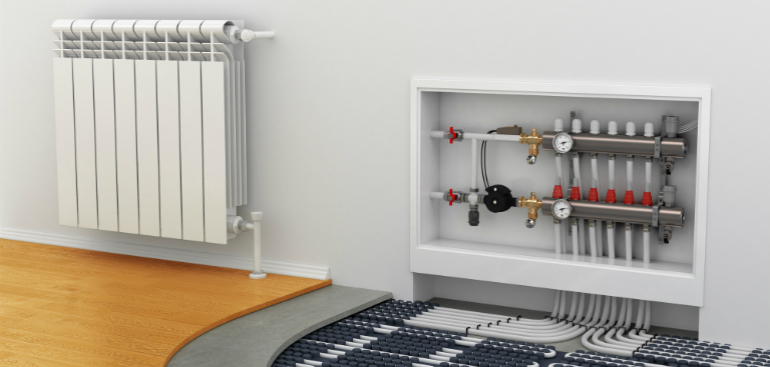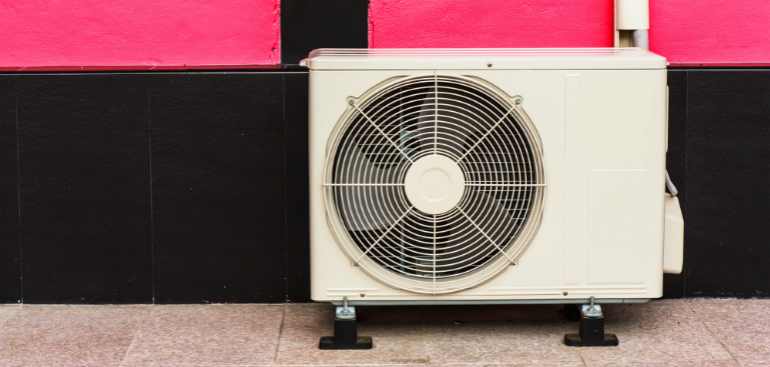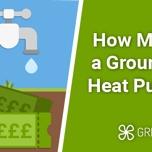
Get up to 4 quotes by filling in only 1 quick form

Slash your energy bills by installing a heat pump

We’ve helped over 500,000 homeowners reduce their carbon footprint
- GreenMatch
- Heat Pumps
- Top 10 Myths About Heat Pumps
Top 10 Myths About Heat Pumps
Introduction to heat pumps
Although the principle behind the functioning of a heat pump has been known for decades, developing a cost-efficient device that would actually turn the surrounding thermal energy into heat while appealing to consumers, became possible just recently. Much of the heat pumps’ growing popularity has been spurred by the ongoing concern for the environment and the uncertainty regarding oil prices.
Around 240,000 heat pumps are currently operational in the UK. More and more people appear to actively embrace the use of renewable energy technologies for a number of reasons, ‘zero emissions’ heating being one of these. The CCC aims to deploy 19 million heat pumps in existing homes in order to achieve Net Zero by 2050
In the context of growing demand for clean, reliable and sustainable solutions when it comes to household heating, the heat pump is among the few technologies capable of meeting the expectations of quality and cost-efficient heating. Thus, the increased interest in heat pumps we are witnessing today should not come as a big surprise, on the contrary, it proves that the pumps are as reliable as conventional heating systems.
To make your buying decision easier, GreenMatch will match you with the reliable suppliers of heat pumps in your area. We will provide you with up to 3 different quotes that fit your needs and budget. You can avoid researching by using our service with no binding obligations, completely free of charge. Get started by simply filling out the form below.
- Quotes from local engineers
- Payment by finance available
- Save up to £1100 per year
It only takes 30 seconds



Busting the myths about heat pumps
In order to promote a better understanding of the functioning of a heat pump and how one can benefit from installing one, we decided to shed light on the 10 most wide-spread misconceptions about heat pumps. In doing so, we aim to clear up some of the confusion surrounding the pumps and make it easier for you to decide if it is worthy or not to buy a heat pump.

“Heat pumps are too expensive.”
Although the pump’s price and the installation expenses can significantly strain one’s budget in the beginning, a properly installed heat pump will help reduce energy costs– the payback period spanning from 5 to 7 years (given that the heating system you are replacing runs on oil, LPG, solid fuel or electricity). You might expect to pay between £8,000 – £18,000 to install an air source heat pump and between £20,000 – £35,000 for installing a ground source heat pump (depending on the extent of the excavation works). Nevertheless, if you are eligible for the RHI (Renewable Heat Incentive) scheme, you’ll be entitled to a government-subsidised payment for using a renewable energy technology to heat your home. Thus, depending on the RHI conditions you are subscribing to, you might expect significant cost returns on your heat pump investment.

“Air source heat pumps are noisy.”
Back in the days, when heat pumps were just emerging on the market, they used to be bulky, unattractive and quite noisy. Today, a modern air source heat pump integrates the latest technologies in terms of noise reduction and energy efficiency enhancement. Thus, the noise an air source heat pump makes is comparable to the one that comes from a home refrigerator. The distinctive sound it makes is due to the pump’s fan pulling the air through the system, which shall not be heard indoors if the pump is properly installed.


“Heat pumps are not efficient during cold winters.”
Due to the constant temperatures of the underground layers it takes the heat from, a ground source heat pump is capable of ensuring an efficiency rate that is consistent all year round, regardless of the outside weather conditions. In contrast, the cost-efficiency of an air source heat pump is directly influenced by the outside temperatures, given that a pump like this extracts heat from the outside air masses.
The efficiency of an air source heat pump will gradually diminish with the decrease in outside temperature levels. Still, given the relatively mild winters in the UK and the latest technological advancements in the field of thermodynamics, an air to air or air to water heat pump can work effectively at temperatures that do not fall below the -5 degrees mark.

“A heat pump needs to stay on all the time.”
Compared to previous versions, the latest heat pump models that are currently available on the market, boast higher heat outputs and subsequently, increased efficiency rates. Thus, if your house has proper insulation and your pump is installed accordingly, you’ll be able to operate it like any other heating system – namely, turn it off or on whenever you find it necessary.
The difference lies in the speed at which a heat pump delivers its output. A heat pump is not able to ensure instant heating all the time – instead, it warms the building gradually, depending on the heating mode that is selected.

“Heat pumps work with underfloor heating only.”
Although a heat pump is more efficient if connected to an underfloor heating system, this does not mean that it won’t work if coupled with commonplace radiators. Still, in order to make sure that you are getting the most out of your ground source heat pump, it is recommended to use large radiators over traditional ones – intended for high-temperature heating. Even with standard size radiators, you’ll still be able to ‘reap the benefits’ of a ground source heat pump heating, as long as you make sure that your house heat loss is reduced to a minimum.

“A heat pump cannot be installed in existing buildings.”
What is so appealing about heat pumps is that, even if it is a complex heating system, it can be easily fitted into different property types – from old historical buildings to new cosmopolitan apartment structures. Air source heat pumps are great retrofits, both air and ground source heat pumps can be installed in existing buildings. In the former case, a site review will be needed before installing a pump, to reduce the property’s thermal needs due to inadequate insulation.

“Heat pumps take a lot of space.”
Whilst a heat pump integrates many external components, like underground loops, outdoor air compressor, pipes, etc. it doesn’t take much space, because most of the pump’s units are hidden from one’s view. In the case of a ground source heat pump, all the loops (otherwise known as heat collectors) are hidden underground, at depths of 20-30 cm (if it is a horizontal loop system) and 50-70m (when using boreholes).
When it comes to air source heat pumps, their external units are a little bigger than the standard air conditioner compressors (depending on the pump’s capacity). Inside the house, the pump’s heat distribution network is not much different from the one used in conventional heating systems. In the case of an underfloor heating system, there is even less space needed, whereas all the pipes and fittings are hidden beneath the floor.


“Heat pumps can be used for heating only.”
The modern heat pump systems can provide both heating during the cold season, and cooling during the hot summer days. For this purpose, most of the heat pumps are equipped with a reversing valve, which if turned in one or another direction will reverse the flow of the coolant that is pumped throughout the system.
In addition to this, a ground source heat pump can provide hot water as well, which can be used for a number of house-related activities like bathing or washing. This being said, if you decide to replace a gas boiler with a heat pump, you’ll be able to heat and cool your home by turning on just a single device.

“A heat pump needs frequent maintenance works.”
Although a heat pump requires more attention and financial resources in the beginning (especially if it is a ground source heat pump), once installed it won’t need frequent maintenance works to be carried out. Since a heat pump does not run on flammable fuels, it proves safer than a traditional heating system that runs on gas oil or LPG.
Nevertheless, it is highly recommended to have the heat pump checked by an expert at least once every two years. It is even more important to undertake these regular checks if you are operating a ground source heat pump, which ground collectors should be checked for cracks or perforations in order to prevent any leakages.

“Heat pumps are money wasters.”
When compared to an ordinary gas furnace or a conventional heating system that runs on oil, LPG or coil, a heat pump (be it an air source or ground source heat pump) can save you up to 30% on energy bills. The extent to which you can save on heating will very much depend on how well your house is insulated and if you are using underfloor heating or standard size radiators to distribute the heat throughout the house. In the coldest days of the winter, when outside temperatures can fall below the -5 degrees mark and stay there for extended periods of time, a heat pump might prove less efficient than a modern gas boiler, all the more a condensing boiler. Nonetheless, given the relative mildness of the British winters, one doesn’t have to worry that much about the pump’s efficiency rate.
Get Quotes on Heat Pumps!
If you have decided to purchase a heat pump, but you are not sure which type you would like, we are ready to help you. Fill out the form on this page with your personal preferences and information, and we will provide you with up to 3 different suppliers of heat pumps. You are free to choose the offer that best suits your needs. The service is free, without obligation, and takes only a few minutes.
- Quotes from local engineers
- Payment by finance available
- Save up to £1100 per year
It only takes 30 seconds




Aris Vourvoulias is the Head of Content in GreenMatch. Aris is a passionate author and marketer with an educational background in journalism. He continuously writes, reviews, and educates himself in the areas of business, finance, and renewable energy. He has managerial experience in many European markets, including UK, Denmark, Sweden, and Finland. He and his content team have been featured on reputable sites like GreenPeace, Guardian, iNews, Gizmodo, and more
 We strive to connect our customers with the right product and supplier. Would you like to be part of GreenMatch?
We strive to connect our customers with the right product and supplier. Would you like to be part of GreenMatch? 



